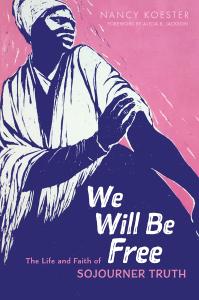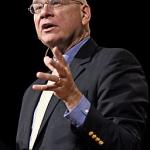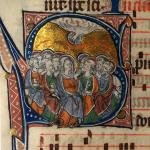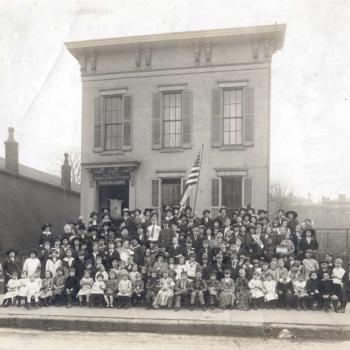 I am delighted to welcome Nancy Koester to the Anxious Bench today to discuss her new biography of Sojourner Truth, We Will Be Free: The Life and Faith of Sojourner Truth (Eerdmans). Koester holds a PhD in church history and has taught at both the college and seminary levels. She is ordained in the Evangelical Lutheran Church in America (ELCA). Her work focuses on nineteenth-century American history, especially the antislavery movement, the Civil War, and Reconstruction. She is inspired by women of that era who, though lacking basic rights, found ways to move the nation closer to its own ideals. She is the author of Introduction to the History of Christianity in the U.S. (Fortress) and Harriet Beecher Stowe: A Spiritual Life (Eerdmans), which won a Minnesota Book Award in 2015. She lives in St. Paul, MN with her husband Craig.
I am delighted to welcome Nancy Koester to the Anxious Bench today to discuss her new biography of Sojourner Truth, We Will Be Free: The Life and Faith of Sojourner Truth (Eerdmans). Koester holds a PhD in church history and has taught at both the college and seminary levels. She is ordained in the Evangelical Lutheran Church in America (ELCA). Her work focuses on nineteenth-century American history, especially the antislavery movement, the Civil War, and Reconstruction. She is inspired by women of that era who, though lacking basic rights, found ways to move the nation closer to its own ideals. She is the author of Introduction to the History of Christianity in the U.S. (Fortress) and Harriet Beecher Stowe: A Spiritual Life (Eerdmans), which won a Minnesota Book Award in 2015. She lives in St. Paul, MN with her husband Craig.
Andrea Turpin: I enjoyed (and taught!) your biography of Harriet Beecher Stowe. What led you to choose Sojourner Truth for your next biography?
 Nancy Koester: I’m drawn to the life stories of 19th-century women who changed society even though they lacked basic rights. For both Stowe and Truth, Christian faith fueled social action. For one thing, they lived before the Fundamentalist/Modernist split that tore apart evangelism and social reform. They didn’t put things in the same boxes that we do.
Nancy Koester: I’m drawn to the life stories of 19th-century women who changed society even though they lacked basic rights. For both Stowe and Truth, Christian faith fueled social action. For one thing, they lived before the Fundamentalist/Modernist split that tore apart evangelism and social reform. They didn’t put things in the same boxes that we do.
What led me to choose Truth for my next biography was her life story and personal charisma. She was enslaved in the North for thirty years, yet went on to become one of the two most famous Black women of the Civil War era (the other was Harriet Tubman). After she became free, her son was illegally sold into Alabama, and she sued for his freedom. She became the first Black woman to win a lawsuit for the return of a child. She devoted her life to getting human rights for Black people and women…and she never separated spiritual freedom from political, intellectual and economic freedom. Truth had very strong verbal gifts, including preaching, singing and her sharp sense of humor then called “mother wit.”
AT: Amen to an interest in women who don’t fit in our contemporary religious boxes! For readers who are not familiar with Truth, how would you briefly summarize her life and significance beyond those highlights?
NK: Sojourner Truth was born into slavery around the year 1797 in the Hudson River Valley. Her name was Isabella, and like so many people in that part of New York State, she spoke Dutch. Shortly after she became a free woman, she had a vision of Jesus that set her direction in life. The vision revealed God’s love for her, and for all people regardless of race. She felt called to preach the Gospel, but had to support herself by doing housework, one of the few jobs available to Black women.
In 1843 she took the name of Sojourner Truth and became an itinerant preacher. She joined an abolitionist commune in Massachusetts, where she met William Lloyd Garrison and Frederick Douglass. When the commune closed, Truth became a traveling lecturer on the abolitionist circuit. Soon she was speaking at women’s rights conventions. She could not read or write, but her ability to speak and sing in public made her stand out in any crowd. She became known for her quick repartee when pro-slavery foes challenged her in public. During the Civil War, Truth worked among the “freedpeople” in and around Washington, DC. She campaigned to get lands in the West where Southern Black people could start a new life.
Truth died in 1883, when Jim Crow laws were rolling back gains in human rights made during the Civil War and Reconstruction. The unfinished business of freedom was taken up in the Civil Rights Movement, and the modern women’s rights movement. Today, Sojourner Truth is remembered as a grandmother of equal rights, as well as a pioneer of female preaching. Truth’s legacy continues to inspire Americans, as shown by recent public art like the Women’s Rights Pioneers Monument in Manhattan’s Central Park. As one of her white friends said of Sojourner Truth, “She belongs to humanity.”
AT: Every biographer of a well-known person brings a unique perspective or question to her subject’s life. What did you hope to bring out in Truth’s story that has not been covered as extensively in the past?
NK: I am indebted to Truth’s earlier biographers, especially Carleton Mabee, Nell Irvin Painter, and Margaret Washington. Yet I hope that two things are distinctive about my biography of Truth. First, I wanted to foreground Sojourner Truth’s Christian faith. And second, I wanted the book to read more like a novel than previous biographies.
AT: Sojourner Truth is most well-known for her 1851 speech in defense of both racial and gender justice, “Ain’t I a Woman?” As you note, she was also an itinerant preacher. So how did Truth’s faith relate to her advocacy work?
NK: Truth believed that all people are equal in the sight of God, who gives the same rights to all. The reason why some people have fewer rights than others is not because God wants it that way, but because some people take away the rights of others. God’s love makes us spiritually free and empowers us to seek political freedom—not only for ourselves but for others. Truth believed that God works in history to bring liberation, though not always in ways we expect. When Truth spoke of abolition and women’s rights, she often drew from scripture. For example, in the “Ain’t I a Woman?” speech, Truth invokes the story of Adam and Eve (so often used to keep women down), declaring that if women had the power to turn things upside down, they can also make things right again and men should let them try.
AT: What surprised you most as you dug deeply into Truth’s life?
NK: I was continually refreshed by Truth’s sense of humor and the joy that she found in life. Despite her many hardships and losses, and the continual prejudice she faced, Truth never let others take away her joy. For example, when working to desegregate the horse-drawn street cars in Washington, DC, she met with both verbal and physical abuse. Yet when a conductor was forced to let her ride, she rode past her stop for the sheer joy of it. “Bless God,” she said, “I have had a ride.”
AT: What do you hope contemporary readers take from Sojourner Truth’s story?
NK: I hope, first of all, that readers will relate to Truth’s quest for justice. Truth accomplished a great deal, with so much working against her. Yet her work is unfinished. If Truth did so much with so few rights, we who now enjoy more rights than she did can do our part, so that each person is treated as a child of God with God-given rights. I hope that people will draw courage and inspiration from Truth.
AT: Thank you so much!













